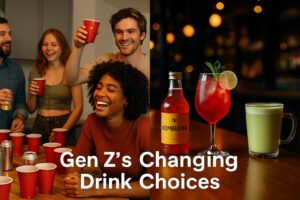
Alcohol moderation, functional ingredients, and the future of on-premise choices
For decades, alcohol was the unquestioned centerpiece of socializing among younger adults. Today, that dominance is under review. While college campuses remain hubs for binge drinking, once Gen Z enters the workforce, their beverage choices begin to look different. They are exploring alternatives—alcohol-free, plant-based, and functional—at rates that suggest a structural change in demand.
Health and Wellness as Drivers
Gallup (2025) reports that two-thirds of young adults believe alcohol is bad for their health, a striking rise from previous generations. This doesn’t mean they abstain entirely, but it does mean the “everyday beer or wine” occasion is less common. Instead, wellness positioning—low sugar, clean labels, adaptogens—gains traction. Functional beverages, from CBD seltzers to mushroom-infused tonics, are marketed as performance enhancers, not indulgences.
The Role of Identity and Lifestyle
Gen Z is often described as “sober curious.” For them, a drink choice isn’t only about taste—it’s a reflection of values. Ordering a mocktail or kombucha at a bar communicates discipline, uniqueness, and a concern for mental clarity. This stands in sharp contrast to Gen X, who drank even while knowing the risks, often as a form of stress relief.
College vs. Post-College Gen Z
FSIP’s own research shows a divide:
- College Gen Z: Alcohol is still tied to social rituals (parties, tailgates, Greek life). Price is less of a deterrent because much of the drinking happens in low-cost or free-flow settings.
- Post-College Gen Z: Binge occasions drop, and moderation takes hold. Alcohol becomes an occasional splurge, while non-alcoholic craft beers, botanical spirits, and sparkling tonics fit into weekday socializing and wellness routines.
Diversity and Drinking Patterns
Alcohol use isn’t uniform across racial and ethnic groups. White and multiracial young adults report the highest drinking prevalence, while Asian, Black, and Hispanic peers report lower levels overall. These differences matter for operators and manufacturers as they plan menus, product portfolios, and marketing campaigns.
Plant-Based and Functional Beverages on the Rise
Plant-based no longer refers just to food—it now extends into beverages. Think oat-based lattes, plant-protein smoothies, or herbal functional shots. Younger consumers often view these as part of their daily routine, the same way coffee or tea once dominated. The lines are blurring: is a CBD seltzer a wellness product or a social one? For Gen Z, the answer is both.
Implications for the Industry
For on-premise operators, beverage companies, and foodservice manufacturers, the implication is clear:
- Offer choice architecture—a mix of alcohol, low/no-alcohol, and functional alternatives.
- Recognize the different phases of life—what sells in a college town may flop in an urban young-professional market.
- Pay attention to cultural diversity, as drinking norms differ by background.
- Treat beverages not just as refreshment, but as identity statements.
Closing Thought
Gen Z is not rejecting alcohol outright—but they are rewriting the rules of when, why, and how it’s consumed. For manufacturers and operators, the opportunity lies in aligning with their values—health, control, diversity, and experimentation—while still delivering the social connection beverages have always provided.
Learn more about our upcoming study on Niche and Functional Beverages On-Premise.
To learn more about FSIP’s Management Consulting Practice, click here.
Like the content? Sign up to receive our communications.
Recent Comments